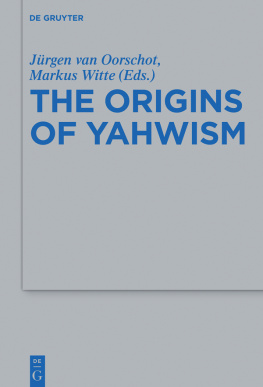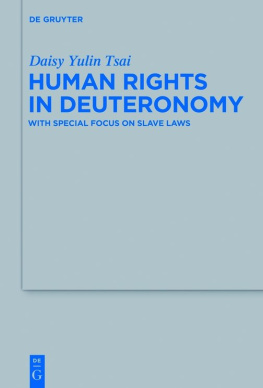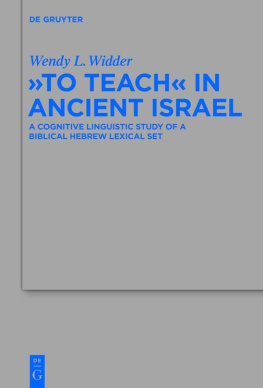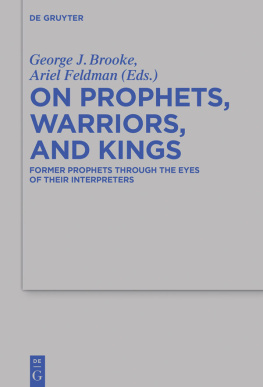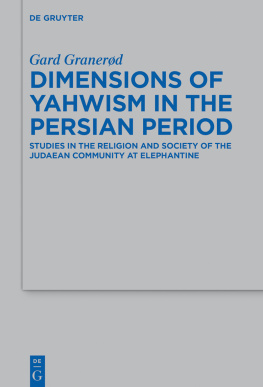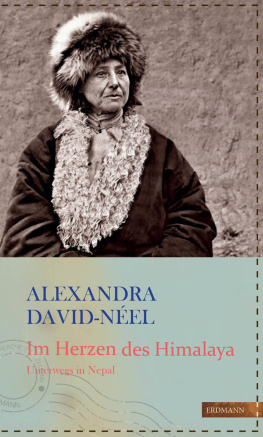Table of Contents
Guide

The Origins of Yahwism
Beihefte zur Zeitschrift fr die alttestamentliche Wissenschaft

Edited by
John Barton, Ronald Hendel, Reinhard G. Kratz,
and Markus Witte
Band 484

ISBN 978-3-11-042538-3
e-ISBN (PDF) 978-3-11-044822-1
e-ISBN (EPUB) 978-3-11-044711-8
ISSN 0934-2575
Library of Congress Cataloging-in-Publication Data
A CIP catalog record for this book has been applied for at the Library of Congress.
Bibliografic information published by the Deutsche Nationalbibliothek
The Deutsche Nationalbibliothek lists this publication in the Deutschen Nationalbibliografie;
detailed bibliografic data are available on the Internet at http://dnb.dnb.de.
2017 Walter de Gruyter GmbH, Berlin/Boston
www.degruyter.com
Introduction
The question of the beginning and origin of the worship of the god Y HWH goes to the heart of Israelite-Jewish self-understanding and touches upon essential aspects of biblical theology. On the one hand, according to the Old Testament tradition the early historical revelation of Y HWH grants Israel its status as the people of God (cf. Exod 19; Deut 7). The establishment of the historical and literary role of the figure of Moses and the Exodus narrative are closely related, but so too are those of kings Hezekiah and Josiah. On the other hand, the question of the beginning and origin of Y HWH worship directly converges with the determination of Y HWH s essence, as is reflected in the various different theologies of the Hebrew Bible.
Furthermore, the beginnings of Yahwism relate to the unresolved problems of the Israelite-Jewish history of religion. One solution, if a solution is to be found, is to achieve an interplay between philology and literary history, epigraphy and religious history, archaeology and cultural studies. Accordingly, the present volume offers a multifaceted analysis of relevant epigraphic, iconographic and biblical sources. In the process, it discusses various exegetical methods and research trajectories. The foundation of the volume is built on seven articles first published in German in 2012 in the Berliner Theologischen Zeitschrift. An updated English version of the philological analysis of the Tetragrammaton by Josef Tropper published in Vetus Testamentum in 2001 has also been newly added; in the estimation of the editors of this volume, Troppers analysis has thus far received too little attention in the scholarly literature. The thirteen contributions brought together here illustrate the plurality of positions in the fierce debate to clarify whether Y HWH originated in the South or the North, and provide a further evaluation of the arguments put forward in this discussion. Insofar as this volume includes European and North American scholars from different generations and confessions, as well as various disciplinary perspectives on the ancient world and religious history, it represents the present state of scholarship and fulfils the function of a current reference work.
The volumes opening contribution from Josef Tropper (Berlin), which proceeds from the Akkadian transcription of North-West Semitic names and the grammatical structure of the Tetragrammaton, subjects the philological derivations of the Y HWH -name proposed in previous studies to a critical appraisal. Tropper himself develops the thesis that the godlike name Y HWH is a genuine nominal foundation, which fits seamlessly into the grammatical system of North-West Semitic onomastics. Tropper thereby deals extensively with the phenomenon of the long form yhwh and the short form yhw/yh ; he discusses the relevant inscriptions from Kuntillet Ajrud and Khirbet el-Kom, which are also taken into account by all of the subsequent contributions to this volume, and touches upon the central questions of Northern Syrian-Palestinian religious symbolism.
The clarification of the beginnings and origins of Y HWH worship is inseparably bound up with the determination of the profile of Y HWH , and closely related to questions about to which type of deity Y HWH ought to be assigned, both originally and in his religious-historical transformations, and how Y HWH fits into the broader world of Ancient Near Eastern deities. The spectrum here ranges from a storm and thunder god to a weather god, all the way to a sun god; and in all these cases substantial affinities with a war god are present. Hence Mark S. Smith (Princeton) provides an overview of identifications of the oldest manifestations of Y HWH with Baal, El, Athtar suggested in the literature, and correlates these with corresponding Egyptian, Ugaritic and biblical traditions and texts. It is clear that there are interferences between theological and regional classifications, and the worship of Y HWH as a universal creator and the lord of history is a product of the theological reflection of the Persian-Hellenistic period.
Insofar as ancient Israel and Judah were always a part of the Ancient Near Eastern world and participated in the cultural and religious developments of Mesopotamia, Asia Minor, Northern Syria and Egypt, taking them up and altering them over time, the question arises as to how Y HWH and early Y HWH worship are represented from the perspective of the religious history of the Ancient Near East. This question is pursued by the assyriologist Manfred Krebernik (Jena) in his presentation: like Smith, he also considers the northern Syrian region, with its late Bronze Age Ugaritic texts which are immensely important for the elucidation of the Syrian-Palestinian religious and linguistic history, and reads central biblical sources such as Ps 29 from the perspective of Ancient Oriental Studies.
The introductory philological and religious-historical essays already cite important inscriptions such as the Moabite Mesha-Stele, in which, according to our current understanding, an East Jordanian king mentions Y HWH as the state god of Israel for the first time in the middle of the 9 th century BCE, and the inscriptions from Kuntillet Ajrud (8 th century BCE), in which not only the inscription Y HWH and (his) Ashera appears, but also pictures of gods/demons and animals next to the name Y HWH . The Egyptologists Faried Adrom and Matthias Mller (both from Basel) therefore subject all of the Egyptian texts which have been cited as supporting documents for the name of Y HWH to a critical review. Late Bronze Age Egyptian place name lists (from Amarah-West and Soleb), which are repeatedly suggested as a local terminal point for the oldest Y HWH worship in the North Arabian (Edomite and Midianite) region, are subject to especially meticulous philological and tradition-historical evaluation.
The archaeological findings in Judah point to worship of Y HWH without images from at least the Persian period, and in pagan world of the Hellenistic period the imageless cult is considered a Jewish speciality. Nevertheless, the precise age of the Old Testament prohibition against images is open to question; so too is whether, contrary to the Mosaic fiction, images still existed during the older Y HWH cult of the Late Bronze Age and Iron Age, and what they looked like. Angelika Berlejung (Leipzig/Stellenbosch) supplies the relevant overview, and describes the fundamental problem of assigning artefacts bearing images of gods to concrete gods and goddesses. In the process she achieves a foundational iconographic and theological contribution to the identification of a god and the relationship between god and image.

